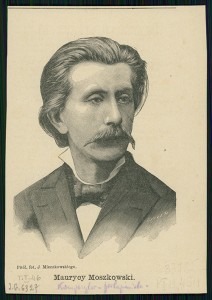 Moritz Moszkowski was known the world over as the “Sunshine Composer.” When he died in April 1925, a prominent musical journal reported, “Moszkowski dead! So painful an announcement has not stricken the entire musical word since the deaths of Chopin, Rubinstein, and Liszt, of whom he was a worthy successor.” Today it seems rather curious that Moszkowski’s name should be included into such an illustrious list of legacy composers. However, at the turn of the twentieth century he was considered the “most successful salon composer of the present day, and a natural heir to Chopin.” His compositions were lighter, wittier, and less pretentious than many of his contemporaries, and he attracted a large following. His formidable pianistic technique gave rise to genial and tuneful works that “never strike an attitude, but aim to charm our senses with melodious, euphonious, and artistically-made music.”
Moritz Moszkowski was known the world over as the “Sunshine Composer.” When he died in April 1925, a prominent musical journal reported, “Moszkowski dead! So painful an announcement has not stricken the entire musical word since the deaths of Chopin, Rubinstein, and Liszt, of whom he was a worthy successor.” Today it seems rather curious that Moszkowski’s name should be included into such an illustrious list of legacy composers. However, at the turn of the twentieth century he was considered the “most successful salon composer of the present day, and a natural heir to Chopin.” His compositions were lighter, wittier, and less pretentious than many of his contemporaries, and he attracted a large following. His formidable pianistic technique gave rise to genial and tuneful works that “never strike an attitude, but aim to charm our senses with melodious, euphonious, and artistically-made music.”
Moszkowski was primarily known as a pianist. He had tremendous technical ability, and he hardly ever missed a note. Yet his playing was said to be cold and lacking passion. By contrast, his contemporary Anton Rubinstein played with a great deal of fire and abandon, but frequently inaccurate. At a Rubinstein recital Moszkowski turned to a friend and said “Anton must be sick tonight. He got two of those top notes right!” As a composer Moszkowski excelled in writing small but delightful piano compositions. However, he also dabbled in larger forms and wrote a piano and violin concerto, a symphony, a ballet and an opera. Condemnation of these works, however, was swift and decisive. “We do not expect heaven-sent inspirations from Moszkowski” a critic wrote, “and his latest work does not disappoint.” The composer was well aware that his music was never going to be able to say something of profound importance, and he was made aware of this shortcoming more than any other composer. Seemingly, he responded with wit and humor and when asked for a copy of his piano concerto Moszkowski replied, “I should be happy to send you my piano concerto but for two reasons: first, it is worthless; second, it is most convenient for making my piano stool higher when I am engaged in studying better works.”
Moritz Moszkowski: Suite for 2 Violins and Piano, Op. 71
Critics immediately hailed the Suite for 2 Violins and Piano as a spectacular and brilliant work, and for many years it remained one of Moszkowski’s best-known compositions. Highly dramatic, and weaving thematic connections between movements, the work is noteworthy for its varied employment of the performing forces. In passages laden with double stops, the 2 violinists are employed in the manner of a string quartet, while at other points the composition unfolds in the manner of a piano trio. Accompanied by rippling arpeggios the opening “Allegro energico” presents two highly attractive and yearning melodies, while the ensuing “Allegro moderato” is cast as a lyrical and elegant waltz. An extended cantilena stands at the core of the slow “Lento assai,” with the high-spirited finale engaging a buoyant and playful subject. Tuneful, cheerful, and without pretention, the work was an audience favorite from the very beginning! Sadly, together with Moszkowski’s entire musical output, it eventually disappeared from the concert stage. With the rise of Internet publishing, Moszkowski’s music is gradually making a comeback. We can only hope that this will stimulate more performances of music by this prolific composer who, according to Paderewski, “following Chopin, best understands how to write for the piano.”
The Suite will be performed at the HKICMF on 19 January 2017.
Official Website
You May Also Like
- Unsung Concertos
Moritz Moszkowski (1854-1925): Piano Concerto Op. 3 Critical mass is a concept used in nuclear physics, group dynamics, politics, public opinion, medicine, and technology.
More Inspiration
-
 Seven Works Dedicated to Brahms Explore the friendships and musical tributes that honored Brahms
Seven Works Dedicated to Brahms Explore the friendships and musical tributes that honored Brahms -
 Creating a New Chopin Explore classical music's transformation in popular genres
Creating a New Chopin Explore classical music's transformation in popular genres - Reflections of the Past: George Rochberg’s Carnival Music Listen to how he blends jazz, blues, and classical quotations
- Smetana’s Musical Postcards
The Albumblätter of a Young Romantic Music composed for his wife, friends and students!


